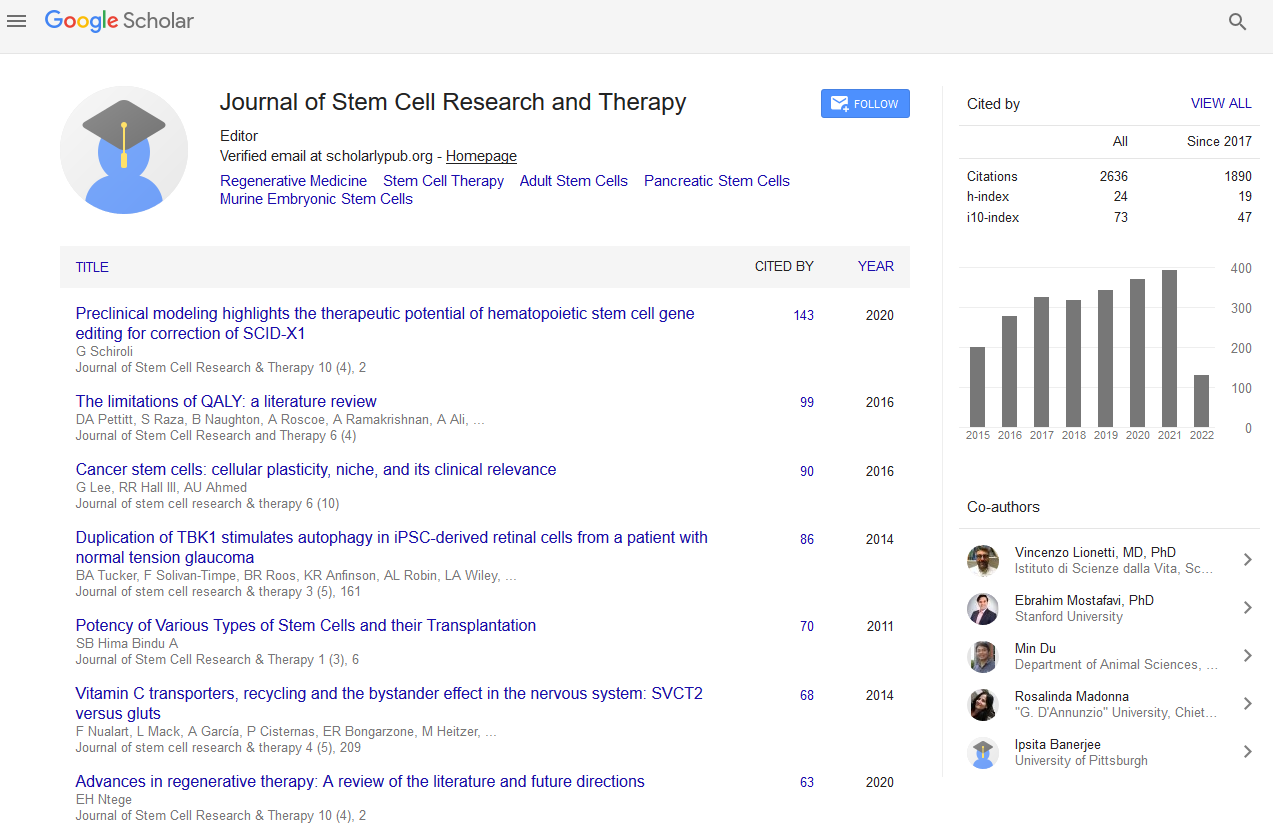Indexed In
- Open J Gate
- Genamics JournalSeek
- Academic Keys
- JournalTOCs
- China National Knowledge Infrastructure (CNKI)
- Ulrich's Periodicals Directory
- RefSeek
- Hamdard University
- EBSCO A-Z
- Directory of Abstract Indexing for Journals
- OCLC- WorldCat
- Publons
- Geneva Foundation for Medical Education and Research
- Euro Pub
- Google Scholar
Useful Links
Share This Page
Journal Flyer

Open Access Journals
- Agri and Aquaculture
- Biochemistry
- Bioinformatics & Systems Biology
- Business & Management
- Chemistry
- Clinical Sciences
- Engineering
- Food & Nutrition
- General Science
- Genetics & Molecular Biology
- Immunology & Microbiology
- Medical Sciences
- Neuroscience & Psychology
- Nursing & Health Care
- Pharmaceutical Sciences
Targeted and efficient delivery of RNAi agents using gold nanoparticles
3rd International Conference and Exhibition on Cell & Gene Therapy
October 27-29, 2014 Embassy Suites Las Vegas, USA
Ferhat Ozturk
Scientific Tracks Abstracts: J Stem Cell Res Ther
Abstract:
One of the major developments in the field of cancer gene therapy is to use nano-materials as transfer vectors. Nanoparticles serve various advantages to deliver the genetic cargo such as; i) easy penetration into the cell membrane due to their miniscule size and polarity character, ii) targeting of cancer cells using specific molecular labels, and iii) efficient transfer to the cytoplasm and/or nucleus of the host cell. Especially, the gold nanoparticles (AuNP) are being widely used in various biochemical and biomedical applications due to their biocompatibility and surface modification potential. RNA interference (RNAi) agents, such as siRNA and shRNA, are highly specific to inhibit the target genes and are mostly delivered into the cancer cells using the viral vectors. However the viral vectors have some side effects such as immune reaction to the vector itself and low transduction efficiency of the genetic cargo, when used to transduce cancer cells. We have developed a novel method of siRNA transfer into the MCF-7 cells using PEGylated AuNPs, which were also conjugated with either RGD or NLS peptides. Successful and efficient delivery of the AuNP vectors into the cytoplasm and/or nucleus was visualized using darkfield illumination. The activation of the siRNAs and inhibition of the target genes were measured using qRT-PCR and western blotting. Consequently, development of AuNPs equipped with target specific ligands promises to be a critical tool in cancer gene therapy.
Biography :
Ferhat Ozturk has completed his PhD at University of Nevada, Reno under the supervision of Christopher Porada and Esmail Zanjani, one of the leading teams of in utero gene therapy. He moved to Creighton University for his Postdoctoral study with Devendra Agrawal in cardiovascular gene therapy research. He then worked with Ali Nawshad at the University of Nebraska Medical Center in the field of cell signaling and bioinformatics of cleft palate. Recently, he moved to Canik Başarı University of Turkey as the founding chair of Molecular Biology and Genetics. He serves as Director of BasGen Cancer Research Laboratory and BalMer Apitherapy Center.


